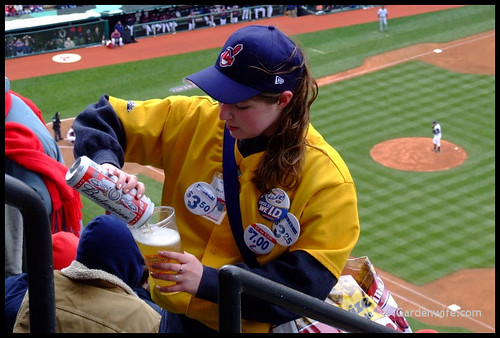Thousands of Sports Fans Drunk After Football, Baseball Games, Study Finds

Flickr image of beer sales at Jacobs Field, Cleveland, by garden wife.
Bloomberg has a story on a study of alcohol consumption of sports fans. From the article:
Almost one in 10 sports fans has a blood alcohol content above the legal limit as they exit the stadium after football and baseball games, a study found. ...
The research, which involved giving breath tests to 362 attendees of 13 baseball and 3 football games, also found that 40 percent had been drinking, according to the report in the journal. Fans younger than age 35 were 9 times likelier to be above the legal limit. The use of alcohol by sports spectators is understudied, the researchers said.
“Eight percent doesn’t sound high, but translate into how many people are leaving the stadium drunk, and you have thousands of people,” said Darin Erickson, the lead author of the study and an assistant professor in epidemiology and community health at the University of Minnesota in Minneapolis, said in a telephone interview.
There are more alcohol-related car crashes after sports games than before or during the same time on nongame days, a previous study by Canadian researchers found. Beside the well- known link between drunk driving and accidents, fans who are drunk are likelier to hurt themselves or others, Erickson said.
Those who attended tailgate parties had a 14 times greater risk of being inebriated than those who hadn’t attended a party. Almost 1 in 4 people who tailgated reported consuming five or more drinks while tailgating, the study found.
Fans who attended night games had higher odds of having a mid-range blood alcohol content, one that wasn’t above the legal limit, than those attending day games, the researchers said. Those who attended Monday night football games were more than four times as likely to have a mid-range blood alcohol content as fans going to other games, according to the study.
----
Another reason to be concerned about public funding of sports stadiums and arenas.
Labels: public health, public safety, sports and economic development, stadiums/arenas



0 Comments:
Post a Comment
<< Home